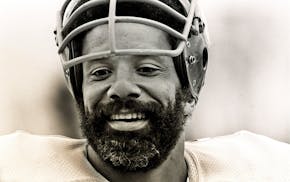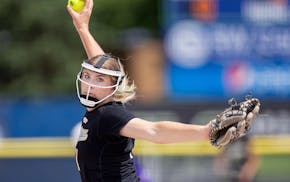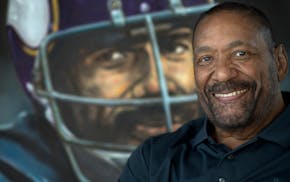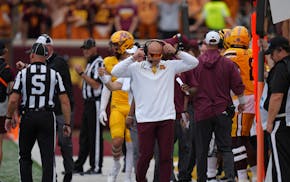The Big Ten will become the Enormous 18 with the start of competition in August 2024. On Thursday, the lengthy dart-throwing contest in the Rosemont, Ill. offices concluded and the conference announced the nine Big Ten opponents for all 18 teams from 2024 to 2028.
Randy Johnson's report on page C1 of Friday's newspaper carried the headline, "Big Ten rivalries protected until 2028."
I hate to disagree with my younger Star Tribune colleagues — which covers all of them — but from a historical standpoint, the Big Ten stopped protecting rivalries a decade ago.
That's when Minnesota vs. Michigan became an option, not a tradition.
First played in 1892. The Little Brown Jug for sideline water — left in Minneapolis by the Wolverines in 1903, returned to Ann Arbor in 1909 — was played for continuously from the end of World War I in 1919 to 2015.
The Big Ten split into six-team divisions — Legends and Leaders — in 2011. There were laughs over these titles, although that split produced much more balance than did the East-West divide that started in 2014.
Plus, the Gophers were in the Legends with Michigan and Iowa, and played Wisconsin in their one guaranteed crossover, meaning the three important trophy games were preserved.
The Michigan series continued in 2014 and 2015, the first two years of East-West. Then the Jug tradition was tossed aside. This is P.J. Fleck's seventh season and Saturday night will be his third game vs. Michigan. The five-year future schedules announced Thursday call for two Michigan games (2024, 2026).
What do you think of that, Fox — the Little Brown Jug has become disposable?
Ken Foxworth, Gophers cornerback, 1976-80, nodded and said: "Running around with that jug at Memorial Stadium is the greatest moment of my football life."
Oct. 22, 1977: Gophers 16, No. 1-rated Michigan 0.
You received the Butch Nash speech on Friday night, right?
"We received the original Butch Nash speech," Foxworth said. "The first one. The first one — that came from deep, down inside, on what it meant for Gopher legends of the past to play Michigan.
"We had guys from all over, and we didn't know about it. Butch was our end coach, of course, and we knew he had played for the Gophers, but when coach Cal Stoll asked Butch to say a few words, we had no idea what was coming.
"Butch didn't talk that long, but I remember looking at some of our defensive line — these big, powerful men — and they were in tears. It was fantastic. When we left that room, we knew we were going to beat Michigan the next day.
"No one else knew, but we did."
The Minnesota fans certainly didn't know. The announced attendance was 44,185, far short of a sellout in the old Brickhouse that would be vacated within five years.
"The Gophers had lost eight, nine straight Jug games, most of 'em lopsided," Foxworth said. "Another of our outstanding coaches, Dick Moseley, was telling everybody at breakfast: 'Not today. That's not going to happen today.' "
You want a smile from a '77 Gopher? Just say, "Not today."
Foxworth has lived in Minneapolis for nearly all of the 47 years since he arrived as a freshman from St. Louis in 1976. Numerous jobs. Lots of community involvement. He's living downtown now, worried about what he sees and even more of what he hears that divides his city.
He's on the ballot next month for the Minneapolis City Council in the Seventh Ward. His opponents are Scott Graham and Katie Cashman. He's underfunded but hopeful.
He wants a full police force and crime to have consequences. He also wants the city to commit more funds to intervene with kids as they're reaching teen years and heading in one direction or another.
"We have to show young people there are true opportunities for them," Foxworth said. "And it can't be make-believe. The opportunities have to be there."
Sounds like wishful thinking, but so did Butch Nash's original speech about what it would mean to beat Michigan, unless you were in the room to hear it.

Reusse: Country boy Jim Marshall never lost his lust for life

Reusse: As Caswell Park does itself proud, a hometown team runs hard into a challenge

Reusse: Jim Marshall belonged to us, and Minnesota loved him for it

Reusse: Murphy's return will be a fun time on the ice





